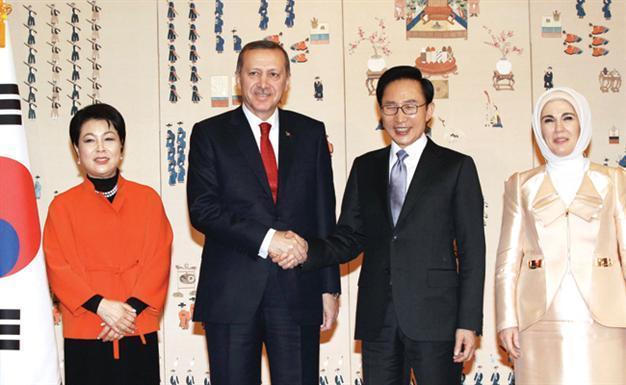Turkey and South Korea pledge stronger ties via free trade deal
ANKARA - Hürriyet Daily News

Turkish Prime Minister Erdoğan (2nd L) shakes hands with S Korean President Lee Myung-bak as their wives stand by them. The two countries eye larger trade relations. REUTERS photo
Prime Minister Recep Tayyip Erdoğan signed a free trade agreement with South Korean President Lee Myung-bak yesterday that aims to boost trade with the South Korean government in the next few years.Foreign Minister Ahmet Davutoğlu, Energy Minister Zafer Çağlayan and Energy Minister Taner Yıldız also took part in the negotiations with Lee, at the end of which the two heads of state signed the free trade agreement, the Anatolia news agency reported.
Erdoğan said the agreement on goods trade will facilitate cooperation between the companies of the two countries and that he expects to see the entire free trade deal finalized by June. He also called for boosting the bilateral trade volume with South Korea, saying the current level of $7 billion a year was too small given the economic power of the two countries. Turkey sells goods worth less than $1.5 billion a year to South Korea.
Erdoğan expressed hope for greater cooperation in energy, defense, automotive and shipbuilding industries, as well as cooperation in science and technology.
“South Korea and Turkey are traditionally friendly nations,” Lee said during the ceremony. “Diplomatic relations between the two countries have been elevated to a strategic partnership this year and at the same time we have signed a trade pact. This will serve as a chance to drastically strengthen economic cooperation between the two countries.”
Lee called for stronger trade ties with Turkey, one of the world’s fastest-growing economies.
South Korea and Turkey have held three rounds of negotiations on a free trade deal since April 2010.
During a trip to Turkey last month, Lee and Erdoğan agreed to conclude their free trade negotiations by the end of the first half of the year.
The envisioned free trade pact with Turkey would allow South Korean firms to export goods to other parts of Europe via Turkey at low prices, as Turkey and the European Union are linked by an agreement removing or lowering tariffs between them.
“For example, Turkish oranges will be sold to Korean customers with cheaper prices. With the agreement, bilateral trade will be boosted considerably,” one South Korean official said. “The same is true for almost everything.”
The Turkish ambassador to Korea, Naci Sarıbaş, said he hoped that the two countries’ recent move from “blood brothers” to “strategic partners” will help strengthen ties in many sectors, according to the Korean Herald.
The close alliance between Turkey and South Korea dates back to the middle of the last century.
Turkey joined the Korean War in 1950, and it had the highest casualty rate in the war. Ankara was granted NATO membership in the early 1950s for its staunch fighting on the side of the United Nations against North Korea and China.
The two countries have a strong defense industry relationship, but the free trade agreement between the two will only make use of the reduction-of-tariffs clause in the pact.
Turkey wants to sell to Korea the T-129 attack helicopters it is co-producing with Italy’s AgustaWestland. South Korean officials said that the T-129 has been short-listed, along with four other companies seeking the deal.
Turkey produces howitzers under South Korean license, and the two countries are together building basic aircraft trainers for the Turkish Air Force. South Korea’s Hyundai Rotem advises Turkey on its main battle tank program. Turkey and South Korea may also build a fighter jet together in the 2020s.
Erdoğan was in Seoul to attend a nuclear security summit.
Two years ago, Turkey and South Korea failed to agree on a nuclear power plant in northern Turkey worth up to $20 billion. Korea is still considered a strong potential partner, and the two countries have agreed to reopen their talks.
Energy is set to be a growth sector for the expanding Eurasian economy, with Ambassador Sarıbaş saying that nuclear power will supply five percent of electricity there by 2020. “Within 15 years we foresee having an investment of $100 billion in our energy sector,” he said.
















